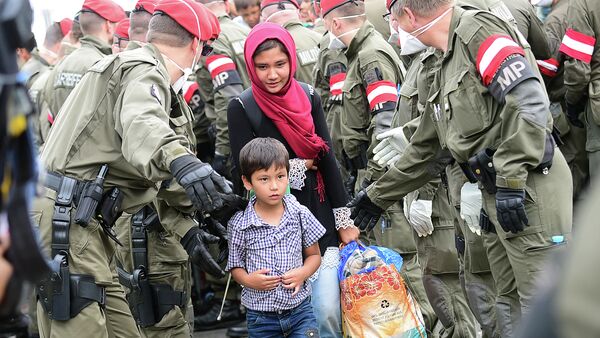The new draft law of the German Interior Ministry, leaked to the German outlet RND, introduces new restrictions for family reunions of refugees. Only spouses, parents of underage children and underage unmarried refugees will get permission to immigrate to Germany.
Other family members, including siblings, are not covered by the newly introduced regulation, according to the report. People who haven’t legally gotten married in their country of origin will be also denied the right to reunite with their alleged spouses in Germany.
The measure is aimed to block jihadists, terrorist perpetrators, hate preachers and leaders of banned terror groups from entering Germany.
The restriction will also affect recipients of social benefits such as the Hartz IV program as the draft law states that family reunification can be refused for those who depend on certain types of allowances “for supporting other family members or other members of the household."
The “Family Reunification Act,” which is to come into force starting August is under discussion among the involved ministries of the coalition government. Germany’s authorities will legally define the terms on which each month up to a thousand foreign family members “may be admitted for humanitarian reasons on a subsidiary basis to the country" and open a "legal entry" for this group.
The German Parliament has approved reunification entry for 1,000 families monthly since August 2018 according to the grand coalition agreement between CDU and SPD. The measure was suspended in 2016. The Interior Ministry, led by the newly appointed Horst Seehofer, was to work out the criteria for the process.
READ MORE: Migrants Propel Germany to Highest Birth Rate in Over 40 Years
The novelty has been reportedly introduced by Germany’s interior minister, Horst Seehofer, representing the Bavarian partner party of the Christian Democratic Union, the Christian Social Union. Since the beginning of his term in mid-March 2018, the former head of state of Bavaria, known for its independent stance on federal issues, including migration, has been in the spotlight for his strong position on the migrant issue.
In an interview with German newspaper Das Bild he said, "Islam doesn't belong to Germany."
"Germany has been shaped by Christianity," the politician stressed, adding, however, that "the Muslims who live with us are, of course, part of Germany," he told the media.
The remark triggered fierce debates within the country, currently dealing with a mass influx of asylum seekers. Even chancellor Angela Merkel had her say on the matter, claiming that "there are 4 million Muslims living in Germany" and "they can live their religion here, too." However, while the politician also acknowledged that Germany was formed by Judeo-Christian traditions, she stressed that Islam is also a part of the country.


